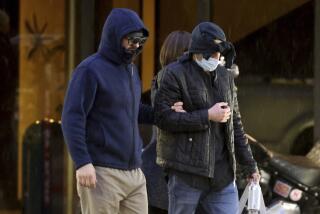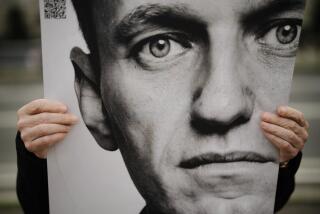Suspect in polonium death points finger at Britain
- Share via
MOSCOW — The Russian businessman accused by Britain in the radiation-poisoning of a former KGB agent staged a high-profile counterattack Thursday, alternately blaming Britain’s intelligence agency, organized crime and a billionaire Russian exile for Alexander Litvinenko’s death.
In a wide-ranging news conference, Andrei Lugovoy, also a former KGB agent, suggested three theories in the slaying of Litvinenko, who died in November after ingesting radioactive polonium-210.
The possible killers, Lugovoy said, are the British MI6 secret service, Russian criminal organizations and exiled Russian tycoon Boris Berezovsky, a fierce Kremlin critic and associate of Litvinenko.
Lugovoy said he believed the Berezovsky theory, already widely broached in the Russian media, was the most probable. He charged, however, that MI6 also was involved. Both Litvinenko and Berezovsky worked for MI6, he alleged, saying the service became dissatisfied with Litvinenko and turned against him.
“It is hard to get rid of the thought that Litvinenko turned into an agent who was going out of special services’ control and therefore was eliminated,” Lugovoy said. “If not by the special services itself, then this was done under its control or with its connivance.”
Asked whether he had evidence to prove the involvement of British intelligence in Litvinenko’s slaying, he replied, “Yes,” but gave no details.
In a written statement prepared shortly before his death, Litvinenko accused Russian President Vladimir V. Putin of ordering his killing, a charge the Kremlin has dismissed as “nonsense.”
*
British response
The British Embassy in Moscow responded to Lugovoy’s charges with a statement that said “this is not an issue about intelligence; it is a criminal matter.”
Glenmore Trenear-Harvey, a London-based intelligence analyst, told the BBC that the allegation that MI6 was dealing with Litvinenko “could well have a degree of truth.”
“That is exactly what the British intelligence services are supposed to do,” he said. “MI6 would have shown interest in him, and indeed, if it were felt worthwhile, might, just might, have made an approach.”
British authorities are seeking Lugovoy’s extradition, citing international treaties and the seriousness of the crime.
Russian authorities have said Lugovoy will not be extradited, because the constitution bans extradition of citizens, but that he might be put on trial here if the British evidence is strong enough. So far, few details of that evidence have been revealed.
Andrei Piontkovsky, a prominent Russian political analyst, said in a telephone interview from Washington that Russian authorities faced two options in the case: “To organize some semblance of a trial of Lugovoy in Russia or deny everything as slander.”
Lugovoy’s news conference, he said, means that “in the worst Soviet traditions they chose the second option: a downright denial.”
“Who can believe that the British special services conducted a special operation with the use of a radiological weapon in the center of London? It is totally absurd,” Piontkovsky said.
Russia is seeking Berezovsky’s extradition from Britain on fraud and other charges, which the exiled tycoon says are politically motivated. Berezovsky has been granted political asylum in Britain.
Lugovoy on Thursday leveled a new charge against Berezovsky, alleging that the exiled billionaire had provided British intelligence with sensitive security documents.
Russia’s Federal Security Service, or FSB, the domestic successor to the Soviet-era KGB, later announced that it would analyze Lugovoy’s charges “from the point of view of potential damage to the security of the Russian Federation.”
Lugovoy implied that the entire Litvinenko affair was a joint effort of Berezovsky and British intelligence to cast Putin in a bad light.
He said that in the months after Litvinenko’s death, he had repeatedly sought a formal invitation to go to Britain to defend himself against the allegations directed at him, but that British authorities had shown no interest in facilitating such a trip. He indicated, however, that he was no longer willing to go.
During his conversations with Litvinenko, “attempts were made to openly recruit me as a British intelligence service agent,” Lugovoy said.
“The Britons in fact suggested that I collect any information that could compromise President Putin and members of his family,” Lugovoy said. “For example, it was proposed that I collect information regarding a government official through whom they expected to collect information discrediting the president. In particular, they planned to lure this official to London to get information compromising the president in exchange for silence about his personal bank accounts.”
Litvinenko proposed that they use a code, Lugovoy said.
“To keep communications secret, I was given an English mobile phone, which I was supposed to use to call London from Moscow,” Lugovoy said. “Furthermore, Sasha [Litvinenko] handed me a copy of the book ‘Rubashka,’ (‘The Shirt’) by Yevgeny Grishkovets, and told me that, from that moment, we were supposed to use a code based on the numbers of pages, paragraphs and lines, as they do in spy movies.”
Lugovoy said that when he refused enticements to be recruited, Litvinenko became “enraged.”
“I think the failure of the attempt to recruit me significantly undermined his value in the Britons’ eyes,” he said.
*
‘Total lies’
Oleg Gordievsky, a former KGB station chief in London who was successfully recruited by MI6 as a double agent when he became disillusioned with the former Soviet Union, called Lugovoy’s allegations “total lies.”
Gordievsky said he believed Litvinenko had only minimal contact with MI6.
“MI6 met him once for a couple of hours, and discussed the situation in the KGB, and then left him in peace, because he was useless,” Gordievsky said. “He told them some few things, what he was actually in possession of.... They didn’t recruit him, they didn’t work with him, because he was empty of knowledge.”
Gordievsky also said Berezovsky was Litvinenko’s “best friend” and would not have had access to polonium-210. It is widely suspected that the material used to poison Litvinenko was manufactured at a Russian government-controlled laboratory.
The evidence provided by his contacts, Gordievsky said, suggests that “Lugovoy organized everything in London.... But it was not him who ordered the assassination. It was some people in Moscow who ordered it.”
Berezovsky issued a statement in London again blaming the Kremlin.
“Following Andrei Lugovoy’s press conference in Moscow this morning, it is now clearer than ever that the Kremlin is behind the murder of Alexander Litvinenko,” Berezovsky said. “Everything about Mr. Lugovoy’s words and presentation made it obvious that he is acting on Kremlin instruction.”
*
Times staff writers Kim Murphy in London and Sergei L. Loiko in Moscow contributed to this report.
More to Read
Sign up for Essential California
The most important California stories and recommendations in your inbox every morning.
You may occasionally receive promotional content from the Los Angeles Times.













